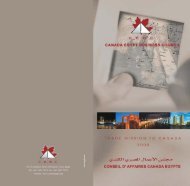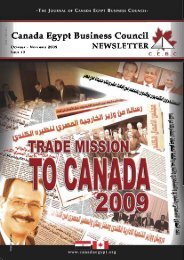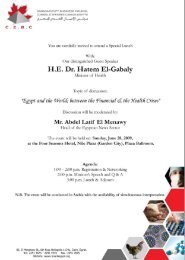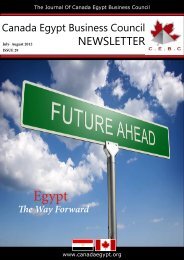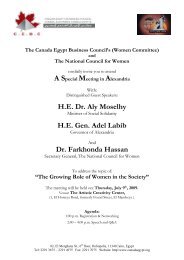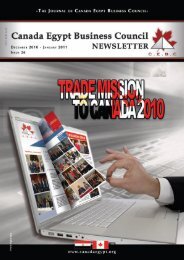NEWSLETTER - Canada Egypt Business Council
NEWSLETTER - Canada Egypt Business Council
NEWSLETTER - Canada Egypt Business Council
Create successful ePaper yourself
Turn your PDF publications into a flip-book with our unique Google optimized e-Paper software.
CEBC<br />
Events<br />
Citing outrageous examples of when the media played a detrimental role in<br />
the country, Raslan criticized the increased yellow journalism particularly the<br />
polarization of Christians and Muslims and media reports that aimed at inciting<br />
one faction of society against the other. “Media created two teams: one fearing for<br />
the security of his nations and the other greedy and rabid and both teams are not<br />
fit to lead the country into revival”. Raslan quoted prominent thinker Ahmed Kamal<br />
Aboulmagd, saying that media is the soft power, which can lead the development<br />
of society or contribute to sinking it in unending turmoil. Raslan concluded his<br />
word highlighting the urgency of improving the media apparatuses and working<br />
towards making them a catalyst of <strong>Egypt</strong>’s development.<br />
Abdel Halim Kandil, Editor-in-Chief of Sout El Omma daily newspaper (The Voice<br />
of the Nation) was a strong opponent of the former regime criticizing it openly<br />
in his writings, and subsequently suffered much, he is also one of the founders of<br />
Kefaya movement, the first movement that called for a change in power in <strong>Egypt</strong><br />
long before the revolution. He held the position of its General Coordinator and is<br />
currently the movement’s spokesperson. Kandil spoke of the historical significance<br />
of the time that <strong>Egypt</strong> is going through, speaking of the Pope, he pointed out that<br />
the sorrow the country is witnessing testifies to the unity of its factions as Muslims<br />
and Christians.<br />
Speaking about media, Kandil sees that a neutral media is mythical and that it is<br />
impossible to isolate the media practitioner from the subject on whom he or she<br />
is reporting, thus, it is more correct to speak of the objectivity of the media and<br />
the accuracy of the information it provides. He added that the media is the closest<br />
work field to politics, and is consequently a reflection of all its characteristics and<br />
that the struggle is inevitably part of human living. “The objective of a society is<br />
to go through the struggle and the continuous jostling with the least amount of<br />
damage,” Kandil said.<br />
Kandil noted that efforts towards discussing the objectivity of the media were<br />
pointless under the former regime, “There was no politics and consequently no<br />
media”, he explained. He said that the majority of media outlets had a single viewer,<br />
listener and reader, which was the ruler, with two types of media remaining still,<br />
one that is state-owned and the other owned by business tycoons, and that both<br />
naturally defended the interests of the bankroller before anything. He noted that<br />
media outlets which were dissident to this majority, contributed to reviving the<br />
nation through the revolution, “They raised the censorship ceiling to the sky, and<br />
not to the sole of his excellence, the president’s shoe,” said Kandil.<br />
CEBC 17



